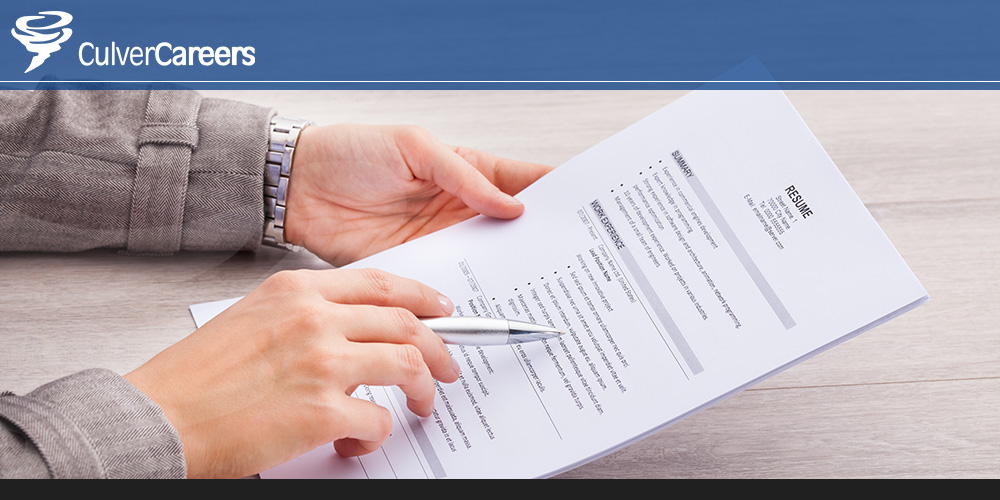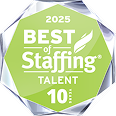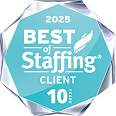Employee turnover can be costly to your company. It wastes time, money, energy, and disrupts the workflow. So, first and foremost, you need to make sure you’re staffing your team with reliable employees who will come to work and do the job you need them to do. You need to be certain before you make a hiring decision.
How Do You Define What It Means to be an Efficient and Reliable Employee?
In basic terms, employee efficiency means completing tasks and responsibilities on time and within budget. Reliability goes hand in hand with efficiency, it’s the proven track record of an employee’s work efficiently over the course of their employment. To be reliable means that they can complete tasks and job functions in a timely, cost effective manner. This includes arriving to the job on time every day, meeting deadlines and following through on requests for help.
How Can a Candidate Demonstrate Their Dependability?
During the interview and hiring process, a candidate can provide evidence of their dependability by showing completion of tasks and job functions within budget and within a prescribed timeline. Showing below budget and before deadline percentages are good indications of dependable employees.
However, this isn’t always possible to know from a job interview. Fortunately, there are other ways to determine a person’s reliability that don’t involve pre-employment testing like personality tests or integrity tests.
Here are four methods you can use to determine how reliable a candidate is.
1. Use Clues from the Job Interview
Did the candidate arrive early? – Promptness and especially an early arrival show excitement and eagerness that will likely translate into a hard-working, dedicated employee.
Did they take the time to research the company? – Learning as much as possible about the company’s business prior to the interview demonstrates a level of interest that goes beyond it being “just another job.” This is another strong indication of a highly motivated employee, which will strongly impact their reliability.
Did they ask questions that showed that they listened carefully? – Asking intelligent questions during the interviewing process shows a high level of interest and involvement. That type of enthusiasm and curiosity will likely bode well for the future.
2. Ask Specific Questions During the Interview and Pay Close Attention to How They Answer
Evaluate Their Commitment.
Why do you want to work here? – In addition to inquiring about candidate experience, ask why they want this specific job. If they’re just looking for something to pay the bills or fill their resume and they’re not passionate about your company or their role in it, they might not be the one you need to get the job done. Enthusiasm and a positive attitude go beyond having the basic skill set.
What are your long-term career goals? – Where do you hope to be in 5 years? Ask about their long-term plans. If they see your company as a placeholder while they look for something better, you might not trust them to churn out quality work and be eager for new responsibilities. But if they’re excited about what you do and seem like they’re motivated to move up the ranks in your company, they’ll probably have a strong work ethic and be successful.
Inquire About Their Needs.
What is your ideal work environment? – Have them describe their ideal work situation and make sure it matches with what you have to offer. If they’re looking for the chance to telecommute but you need your staff to be onsite, then they might not be happy working for you. And if they’re dissatisfied, they’re probably not going to be very driven to go the extra mile. Instead, they might check out or even quit.
Ask About Their Work History
What was your most difficult workplace decision? – Ask them to describe what it was and how they handled it. You want to hear about their history with high-pressure situations. If the stress was too much and paralyzed their ability to function, this is not a good sign. If they accepted the challenge and were able to work through it, you’re probably dealing with someone who has advanced problem-solving skills, who you can trust with future high-pressure situations and projects.
What do you do when a disagreement arises? – Ask about a time they disagreed with a co-worker. Were they able to constructively problem-solve the issue? Or was it too much for them to bear? As they’re describing the situation, note whether they repeatedly blame others or accepted responsibility. Conflict at work is inevitable, so it’s important they can be mature and resolve the matter without disrupting the workflow. Behavioral interview questions can help with your assessment and tell you a lot about a potential employee.
What do you do if the workday ends and you haven’t finished your work for that day? – The answer to this will tell you if this candidate will go the extra mile (or the extra hour) to excel in their position.
Ask How They Deal with the Work-Life Balance.
Tell me about a situation when it’s ok to be late for work. – Unexpected things will happen. What you’re looking for here is what they consider to be “beyond their control.” Is it an actual emergency, an unexpected traffic problem or something else? Do they immediately call and let their supervisor know?
What happened the last time your personal life pulled you away from work? – This will indicate if they’re able to handle the work-life balance. If they have recurring family crises they can persevere through, great. If they’ve had to miss time for them or they’ve been too distracting for them to get anything done, they might not make the most reliable employee. Pay attention to how they handled their absence, such as letting management know about their situation and making up the time.
3. Ask Their References About Their Character, Job Performance and Reliability
Many hiring managers might not want to take the time to contact former employers, but it’s extremely helpful in your final assessment and a great way to know for certain if that person is reliable.
4. Work With a Recruitment Partner
Specialized recruitment firms spend time researching candidates and conducting due diligence before presenting them to a client. They’ll ask questions and conduct thorough reference and background checks. For consultants, they’ll examine their performance at past assignments. A professional recruiter helps managers through the entire selection process.
By following these guidelines, including what to ask in an interview, a company can bring on board the most qualified and driven employees.




